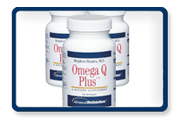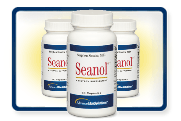Although most people typically think of high cholesterol as a problem that affects primarily middle-aged men, the surprising fact is that high serum cholesterol is most prevalent among white, non-Hispanic women, according to the Centers for Disease Control and Prevention in Atlanta. Conventional treatment for high cholesterol usually involves costly statin drugs such as Lipitor or Zocor, which reduce LDL (low-density lipoprotein) cholesterol. However, statin drugs can cause a variety of side effects, including gastrointestinal problems such as abdominal pain, constipation, diarrhea, indigestion, flatulence and nausea, as well as dizziness, headache, rash and sleep disturbances. There have also been reported cases of patients experiencing peripheral neuropathy (injury to the nerves of the arm/legs), cataract progression, and a progressively decreased therapeutic response to statins after long-term treatment. The most serious, although infrequent, adverse event experienced with statin drugs is hepatoxicity (liver damage).
Furthermore, statin drugs inhibit Co-Q10 production, which can lead to congestive heart failure, high blood pressure and low energy. Fortunately, there are many herbs and natural supplements that have been shown to not only lower total cholesterol, but also raise HDL (high-density lipoprotein) cholesterol levels and lower lipoprotein(a)--a damaging blood fat similar to LDL cholesterol. Individuals with high plasma levels of lipoprotein(a) have a 10 times greater risk for heart disease than individuals with elevated LDL levels.
GUGGUL LIPID
Guggul Lipid is made from the gum resin of a small thorny tree native to certain semi-arid regions of India. The use of guggul for obesity and the "coating and obstruction of channels" dates back to ancient Ayurvedic medicine. Guggul is the most important resin in Ayurvedic medicine and is considered the best remedy for arthritic problems. Ayurvedic physicians also use guggul for nervous conditions, respiratory congestion and coughs, skin diseases, and weight reduction. Guggul is believed to stimulate white blood cell activity to fight infection, relieve congestion in the lungs, heal the skin and mucous membranes, help regulate menstruation, and promote the elimination of dead tissues, fat, toxins and tumors. Recent scientific studies confirm guggul lowers LDL cholesterol and triglycerides and raises HDL cholesterol. In fact, research published in the Indian Journal of Medical Research shows total blood cholesterol levels have been reduced by 20% or more, solely based on the basis of guggul supplementation.
Guggul has been the focus of a number of clinical studies in which researchers found cholesterol levels could be reduced 14-27% and triglycerides could be lowered 22-30%. The Journal of the Association of Physicians of India published a study on guggul's effect in the treatment of serum lipids in obese hypercholesterolemic patients. Results following the 21-day study demonstrated that an extract of guggul significantly reduce serum cholesterol and serum lipids, comparable to or better than results obtained using the drug, clofibrate. The Indian Journal of Medical Research published a study on guggul which determined its anti-inflammatory activity. Results showed an extract of the herb produced a noticeable effect on both primary and secondary inflammation (artificially induced).
The extract also exhibited better results than hydrocortisone in improving the seriousness of secondary lesions, as well as comparable anti-inflammatory activity. Guggul has also been shown to reduce platelet adhesiveness and increase the blood's fibrinolytic (fibrin-breaking) ability, both of which help prevent thrombosis, lessening the risk of coronary heart disease, including heart attack and stroke. Experimental and clinical studies have been conducted at Banaras Hindu University in India on the effects of guggul in atherosclerosis and obesity--reducing blood fats also plays a role in weight loss.
ARTICHOKE LEAVES
Artichoke leaves are well-known to stimulate bile flow from the liver, which in turn helps lower serum cholesterol levels. A recent double-blind, randomized, placebo-controlled multi-center clinical trial was conducted to assess the effects of artichoke extract on patients with initial total cholesterol levels greater than 280. After 6 weeks those taking artichoke extract showed an 18.5% decrease in total cholesterol and a 22.9% decrease in LDL cholesterol, compared to the placebo group which showed reductions of only 8.6% and 6.3% respectively. Researchers concluded that this study provided clear evidence for recommending artichoke extract for treating hyperlipoproteinemia (excess lipoproteins in the blood) and thus, prevention of atherosclerosis (thickening/hardening of the arteries due to buildup of cholesterol and fatty deposits) and coronary heart disease (a condition involving the heart and coronary arteries characterized by atherosclerosis deposits in the arteries that block blood flow to the heart, causing a heart attack). In addition, artichoke extract has been shown to slow the oxidation of LDL cholesterol in vitro--oxidation of LDL cholesterol contributes to the forming of plaque deposits in the arteries.
INOSITOL NICOTINATE
Inositol Nicotinate contains both inositol (a member of the vitamin B-complex) and niacin (nicotinic acid, also known as vitamin B3). The use of niacin in large doses is well-known for its effectiveness in reducing cholesterol and triglycerides. However, high-dose niacin therapy can cause intense flushing for 30-60 minutes after it is taken and may also cause gastrointestinal disturbances such as indigestion and diarrhea. Fortunately, inositol nicotinate appears to provide the same actions as niacin--the ability to inhibit cholesterol production in the liver; increase HDL levels; and decrease VLDL (very-low-density lipoprotein) synthesis in the liver, resulting in a reduction in LDL, total cholesterol and triglyceride levels--with no adverse effects reported. In addition, inositol nicotinate acts as a vasodilator (a substance that causes dilation or opening of blood vessels) to improve microcirculation in patients with Raynaud's disease--a condition commonly resulting from atherosclerotic deposits in the arteries.
POLICOSANOL
Policosanol, a proprietary extract derived from sugar cane wax, is one of the newest discoveries in the treatment of heart disease risk. Policosanol appears to work primarily by inhibiting the liver's production of cholesterol. A review of placebo-controlled lipid-lowering studies using policosanol and studies investigating policosanol's actions and chemistry revealed that at doses of 10 to 20 mg per day, policosanol can reduce total cholesterol by 17-21% and LDL cholesterol by 21-29%, and increase HDL cholesterol by 8-15%. According to research, policosanol also appears to be a very promising natural alternative to classic lipid-lowering drugs such as the statins. For example, one study showed that policosanol produced more effective changes in HDL cholesterol and demonstrated a better safety and tolerability profile than lovastatin. Likewise, another study found the effects of policosanol on lipid profile and platelet aggregation (blood clotting) in older patients with type II hypercholesterolemia and high coronary risk to be more favorable than those induced by the same doses of pravastatin. Furthermore, a randomized, double-blind, placebo-controlled study involving healthy volunteers found policosanol (20mg per day) to be as effective as aspirin (100mg per day) for reducing platelet aggregation.
RESVERATROL
Resveratrol, a compound found in grapes and red wine, may help prevent heart disease. Researchers have found that resveratrol inhibits the formation of blood clots which can lead to heart attack and stroke. Resveratrol also participates in cholesterol metabolism and thus may help prevent the formation and build-up of plaque deposits in the arteries. In addition, resveratrol has been shown to protect against LDL oxidation in vitro. Furthermore, animal and in vitro studies suggest that resveratrol may function as an anti-cancer agent.
PHYTOSTEROLS
Naturally occurring plant sterols have proven cholesterol-lowering benefits and are recommended by the American Heart Association and the National Cholesterol Education Program
Expert Panel to help reduce LDL cholesterol. Phytosterols, which are poorly absorbed, lower cholesterol by interfering with its absorption in the small intestine. Human studies have found that at least 3 grams of phytosterols daily produce significant lipid-lowering effects. Furthermore, anecdotal reports that mushrooms, seaweed and spirulina lower cholesterol could be attributed to the phytosterols they contain. |




